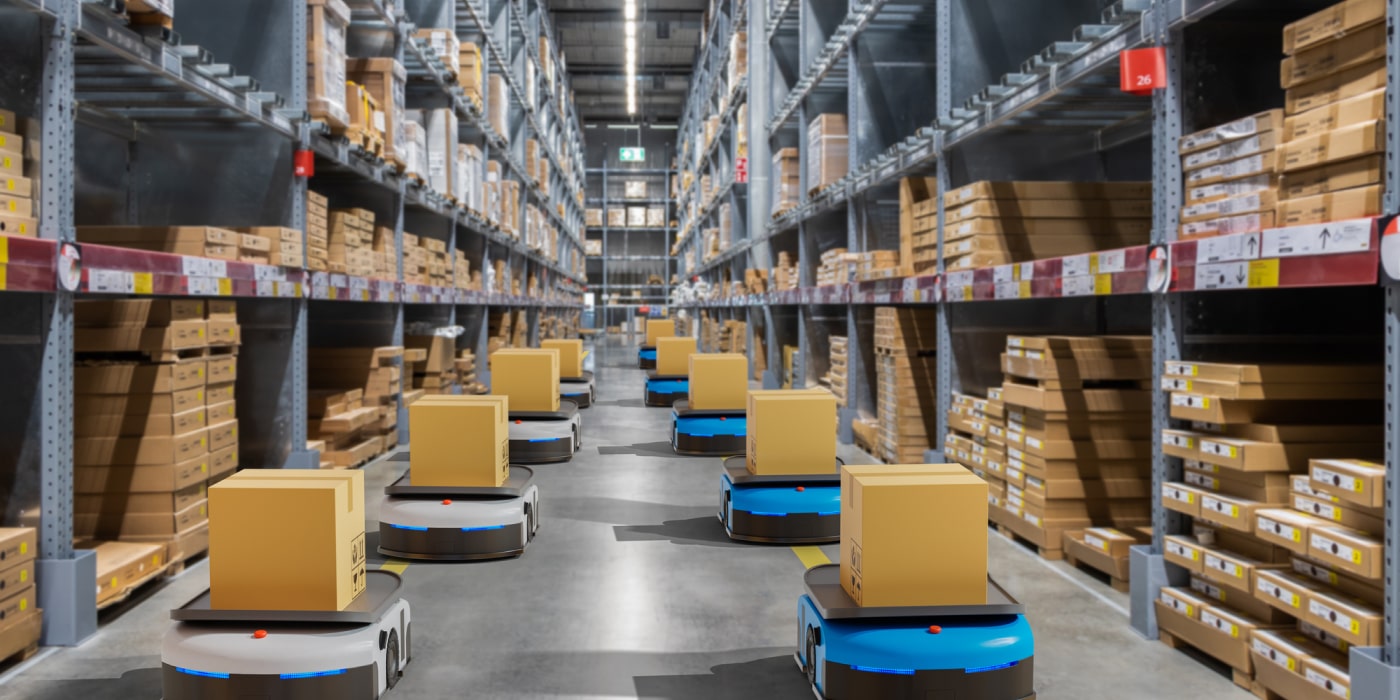Supply Chain and Logistics Technology Trends for 2025
The supply chain and logistics landscape is shifting as the need for greater resilience, agility, and efficiency is pushing businesses to adopt technologies that redefine traditional practices. Next year, innovations in technology will continue to reshape how goods are stored, tracked, and delivered, enabling companies to become more flexible, efficient, and responsive to the demands of their customers.
Here’s a look at four trends in supply chain and logistics technology to watch in 2025.
Warehouse Automation and Robotics
Automation and robotics are reshaping warehouse operations, boosting productivity, efficiency. and accuracy. The market for warehouse automation is expected to grow to $55 billion by 2030, according to a report from LogisticsIQ. With online retail calling for massive volumes of picking, packing, and delivery services, automated warehouses are rapidly becoming more of a necessity. Companies are increasingly adopting robots in their warehouses to handle repetitive and labor-intensive tasks, manage high volumes of goods efficiently, and reduce delivery times.
S&S Activewear, a distributor of apparel and accessories, recently announced it has scaled up its partnership with Körber Supply Chain Software and Geekplus to optimize its warehouse operations in Reno, Nevada, and Reading, Pennsylvania, with the roll-out of a robotic picking solution at significant scale. The deployment of the new system will increase the accuracy of customer orders, enable the company to fulfill customer orders in a fraction of the time required with legacy systems while also creating a safer, more streamlined working environment.

AI-Powered Decision Making
Artificial intelligence (AI) is transforming supply chain and logistics operations. Artificial intelligence is driving smarter and faster data processing and decision-making across the supply chain. AI-driven solutions allow businesses to analyze massive amounts of real-time data, enabling them to predict demand, manage inventory, and identify potential disruptions before they occur. Heading into 2025, 35% of supply chain executives named AI as their top concern, according to a new Accenture survey. Fifty-three percent of organizations plan to significantly increase their investment in AI in 2025, and 42% plan moderate additional investments.
DHL Supply Chain has launched a major initiative to integrate Generative AI tools across its data management, customer support, and proposal processes, working alongside Boston Consulting Group. The AI rollout is designed to boost the speed and accuracy of customer proposals and enhance data processing, bringing quicker, personalized solutions to clients. One of the key tools, a data-cleansing AI, helps DHL organize and analyze customer data more efficiently, streamlining logistics planning. A proposal development tool assists the sales team in better understanding customer needs, allowing for quicker, more precise proposals.
Automated Fulfillment
Automation reduces labor costs and enhances fulfillment speed, making it a must-have for competitive businesses. Retailers are increasingly investing in automated micro-fulfillment centers. These smaller, automated hubs bring products closer to consumers for faster last-mile delivery. As eCommerce continues to grow, investing in fulfillment automation is key to efficiently managing high order volumes, improving workforce productivity, and meeting customer expectations for faster fulfillment.
FedEx is preparing to scale its eCommerce fulfillment offering through a strategic alliance and investment in Nimble, an artificial intelligence robotics and autonomous technology company. Through the alliance, FedEx can use Nimble’s fulfillment centers. This will enable expansion for FedEx Fulfillment, which is geared toward order fulfillment and inventory management for small and medium-sized businesses. Nimble has six fulfillment centers already open or planning to launch by next year in the U.S. and Mexico. These facilities feature the company’s robotic systems that autonomously pick, pack and handle products for brands.

Cloud-Based Platforms
Cloud-based platforms are transforming supply chains and logistics operations, enabling real-time data sharing, reducing information silos, and improving communication and coordination between shippers, logistics providers, and customers. Seventy-two percent of companies are either already using or currently evaluating cloud-based applications, according to Modern Materials Handling’s 2024 software reader survey. Companies see the cloud as an access point for analytical data, a more secure software option, and a way to get everyone working from a single source of truth.
Cloud-based platforms will foster greater agility in the years to come, enabling businesses to adapt to increasing supply chain disruptions and changing market demands more effectively. A cloud-based delivery management system centralizes all delivery management tasks including real-time delivery tracking, route optimization, and scheduling. By consolidating data in one location, companies can access and analyze real-time information, allowing them to make faster, more informed decisions, reduce operational costs, and enhance the delivery experience.
As we look toward 2025, supply chain and logistics operations are becoming more advanced, flexible, and connected than ever before. Technologies are streamlining processes, improving visibility, and enhancing customer satisfaction. Staying agile and investing in the right technologies will not only improve efficiency but also ensure resilience in the face of disruptions.
For more information about how our delivery management solution can help you manage your deliveries more efficiently, please contact info@bringoz.com.
